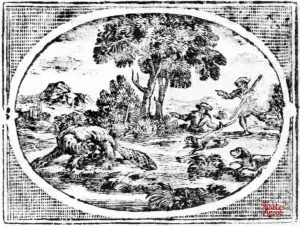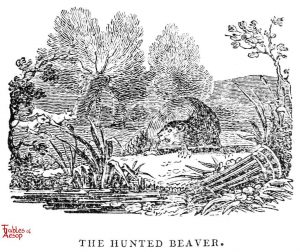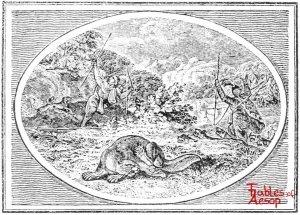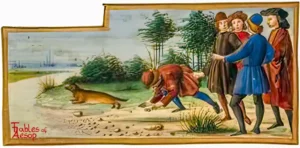Beavers have been hunted for their tail being medicine. When chased, a Beaver escaped capture by biting his tail off.
Sometimes a small sacrifice results in a greater good.

JBR Collection
The tail of the Beaver was once thought to be of use in medicine, and the animal was often hunted on that account. A shrewd old fellow of the race, being hard pressed by the Dogs, and knowing well why they were after him, had the resolution and the presence of mind to bite off his tail, and leave it behind him, and thus escaped with his life.

Samuel Croxall
IT is said that a Beaver (a creature that lives chiefly in the water) has a certain part about him, which is good in physic, and that, upon this account, he is often hunted down and killed. Once upon a time, as one of these creatures was hard pursued by the Dogs, and knew not how to escape, recollecting with himself the reason of his being thus persecuted, with a great resolution and presence of mind, he bit oft the part which his hunters wanted, and throwing it towards them, by these means escaped with his life.
THE APPLICATION
However it is among beasts, there are few human creatures but what are hunted for something else, besides either their lives, or the pleasure of hunting them. The inquisition would hardly be so keen against the Jew, if ihey had not something belonging to them which their persecutors esteem more valuable than their souls; which whenever that wise, but obstinate people, can prevail with themselves to part with, there is an end of the chase, for that time. Indeed, when life is pursued, and in danger, whoever values it, should give up every thing but his honour io preserve it. And, when a discarded minister is prosecuted for having damaged the commonwealth, let him but throw down some of the fruits of his iniquity to the hunters, and one may engage for his coming off, in other respects, with a whole skin.

Thomas Bewick (The Hunted Beaver)
A Beaver, having strayed far from his dwelling, (which it is well known these animals construct with infinite sagacity) was closely pursued by the hunters, and knowing that he was thus persecuted for the sake of the castor, which is contained in two little bags placed underneath and near the tail, he, with great resolution and presence of mind, bit them off with his teeth, and leaving them behind him, thus escaped with his life.
APPLICATION.
It is in vain for individuals to contend against an overwhelming power, and an ineffectual resistance to violence only tends to double our sufferings. When life is pursued, and in danger, whoever values it should give up every thing but his honour to preserve it; and there can be no disgrace in yielding voluntarily to our persecutors, when we are certain that resistance is in vain: but this doctrine can seldom be applied to the case of a whole nation, for when tyranny and rapine are making their wicked strides over a country (as has sometimes happened even in Europe) the people would seldom fail to rid themselves of their oppressors, if they resolved to rise as one man, and bravely oppose them.
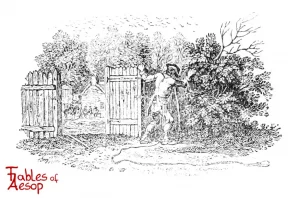

L’Estrange version
The bever is a kind of an amphibious creature, but he lives mostly in the water. His stones, they say, are med’cinal; and it is principally for their sake he knows, that people seek his life; and therefore when he finds himself hard pinch’d, he bites ’em off, and by leaving them to his pursuers, he saves himself.
Moral
When a greater interest is at stake, ’tis a warrantable point of honour and discretion, to compound the hazzard, by parting with the less; provided, that while we quit the one, we may save the other.

Gherardo Image from 1480

Castor et Venator
Castor est animal in paludibus sese nutriens, cuius testiculi variis medelis utiles esse dicuntur. Itaque cum quispiam eum sequitur, venationis causam non ignorans, fugit ad speluncam ubi, ab hominum conspectu canumque odoratu securus, testes dentibus exscindit et venatoribus appropinquantibus relinquit, et hoc pacto se securum praestat.
Moral
Sapiens, ut a periculis se eripiat, nihil intentatum relinquit.
Perry #118
